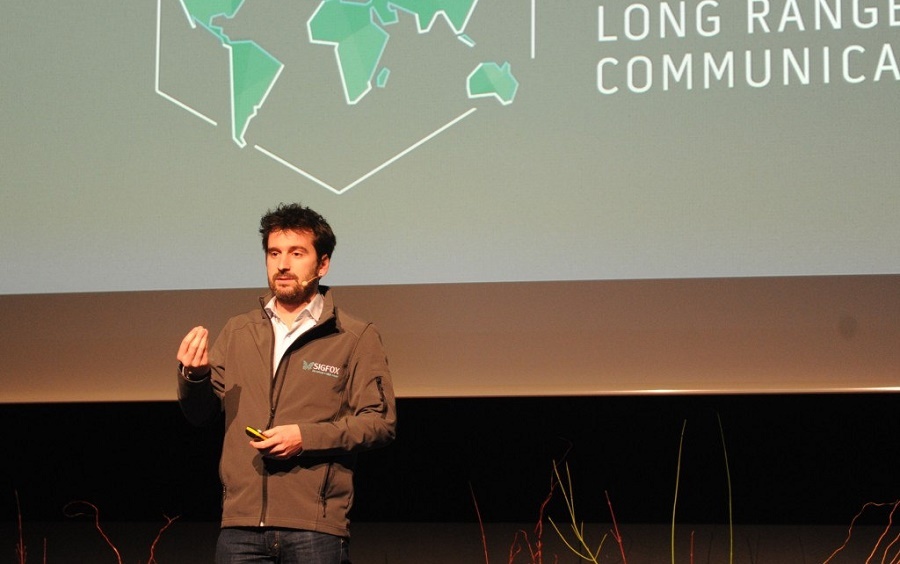What I know about IoT: Cedric Giorgi

The Internet of Things (IoT) is throwing off some new innovations, one of which is the need for something called a ‘low power network’.
Connected devices such as sensors use very little energy. As such, companies like French startup Sigfox are building completely new networks for these devices to ‘talk’ to each other. Think of it like the GSM network your phone runs on: GSM is a radio band, or frequency, which mobile phone networks run on. Sigfox uses a different frequency - the ISM radio band.
Already Sigfox is operating in the Middle East. Oman was the first country on board, wanting “to show they can be leaders in terms of new technology and innovation,” said head of startup relations Cedric Giorgi. Other countries will be added before the end of the year.
“We are a new kind of carrier, so we’re disrupting networks,” he said. “[We built] base stations [which devices connect to, like a cellphone tower], antennas with transmitters, and we’re mapping countries to create a new connectivity service.”
Sigfox is providing the hardware to partners in each country. On this network companies can build platforms for devices to connect and for other companies to provide services around those devices. For example, Spimesense Labs in Egypt provides a management platform for devices on the Sigfox network.
Giorgi is an entrepreneur himself, cofounding a French home-cooked meal startup Cookening, and is very excited about the possibilities offered by IoT and in particular the way these devices can connect.
In 20 years there will be no IoT. We won't even bother to check if things are connected or not, we'll live in a world where it's logical that everything is connected. The phrase ‘Internet of Things’ is actually nonsense.
Low power networks are now a given. When I joined Sigfox people were asking me why we need a low power network. Two years later this question doesn't come anymore because we need something for low power systems.
People think IoT is a fad. And it's true right now, because an IoT ecosystem takes time and smart homes are still disappointing. But niche systems, that are not sexy for the press or are highly technical will start to be rolled out. Like telemetering. Telemetering is an old use case but it's everywhere now. It’s when ‘smart’ water meters, gas meters, electricity meters are connected to the internet, it's a no brainer.
Don’t trash it too early. The Internet of Sh*t Twitter account highlights useless objects which have been invented just for the sake of being connected, but they’re not for a real use case. The people behind the account helps make sure people get a real sense of IoT. The only bad thing is that in the innovation world, in many cases, you have absolutely no idea how big something could be. Snapchat and Twitter were trashed in the beginning but in the end they became big platforms.
Smart cities are yet to show their potential. On one hand, they’re interesting,and on the other they’re disappointing because we haven't seen big big projects taking off. Very often it’s because of [the need for a lot of] integration and costs are still expensive. One of the things we work with all of our partners on is how can we work together to lower the price.
Entrepreneurs are stuck at the product phase. The shift to services is starting but it's still very young. Very often people start by focusing on hardware. Activity trackers are the best example of how people missed [an opportunity]. I can track what I'm doing, number of steps etcetera, but what's the point? After a few months you don't use it anymore. Whereas having trackers for elderly people or people who’ve had a stroke that can alert people if they fall or something, that's an interesting application. But it's much harder than just building hardware because you need to involve all the stakeholders, from the hardware maker to the medical staff and healthcare system.
Auto-shopping is going to change our lives. This is the idea of having a system like Amazon Dash and being able to buy products [at the push of a button in your house]. I don't want to spend my time on groceries. I want to spend time on simple things with my daughter, my friends, or doing something with my hands like art, soon all boring things will be [over]. That's the world we're going to be in.
No one likes to talk about IoT system ‘breakdowns’. It's not that we don't want to answer that question, but it's been the same for years when you rely on partners. Whether you're on the corporate side or the consumer side, what happens when you want to build something with Twitter and they stop the platform? You're dead. What happens when Facebook keeps closing its platforms? You will have to find another partner.
Soon IoT will start harvesting your energy. Three to five years from now we're going to see really interesting sensors which are energy independent. For example if a sensor measures the number of people walking on the sidewalk, [you can have a platform that gathers the kinetic energy of those people].
The merging of ‘worlds’ is coming. The next step is the total integration of the physical world into the digital world. You will be able to connect this existing data with artificial intelligence and very soon we're going to be really in a ‘second world’.
Feature image via Picssr.


